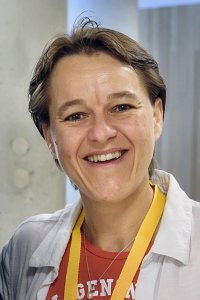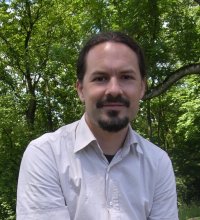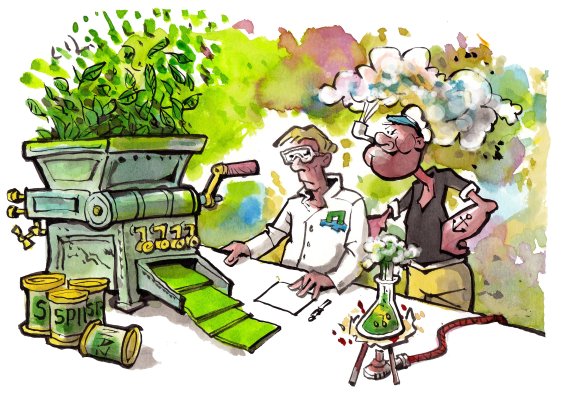illustration Henk van Ruitenbeek

Gerlinde De Deyn
Personal professor of Soil Quality
‘I basically feel unrestricted, but it’s becoming more difficult. We are being influenced in our research aims. You now have a mandatory application section even for the Vidi grants, which are supposed to be for basic research. I wouldn’t be surprised if you now have less of a chance with a purely fundamental proposal. I think it’s a pity that research is becoming less free and unfettered in this way. It’s not so much of a problem for me personally. My research lends itself to collaboration with companies and that collaboration sometimes genuinely helps me to do my job better. I have had situations where I wanted to research a whole range of factors and the collaborative partners then helped me to select the most important ones. That needs to be acknowledged.’

Wieger WamelinkE
ecologist, Wageningen Environmental Research
‘I feel free to research what I want but you do need to be creative. For example, it’s difficult for me to find funding for my project on plant growth on Mars. So now I’m resolving that with crowdfunding. Sometimes I can’t immediately find funding so I put projects on the back burner. When there’s more money available, I pick them up again. I’m fine with doing contract research in between and answering other people’s questions, but clients have no say about the conclusions. They know that and I’ve never had any problems with that. At the same time the focus on the Top Sectors does concern me. There is hardly any money for environmental research now because companies don’t get an immediate benefit from it and so they don’t contribute. You can make up for this to some extent with alternative forms of funding such as crowdfunding but that’s not a structural solution. It is no coincidence that Wageningen Environmental Research is going through such tough times.’

Christian Fleck
Associate professor of Systems and Synthetic Biology
‘There is nobody telling me what I should do, so in that sense I’m free. But even so, job performance appraisals are mainly about how much funding I raise for research and less about the number of publications I’m involved in. To secure funding, I need to think strategically and focus on certain themes, so that restricts my freedom. There is a strong focus on simple indicators like the impact factor of the journals we publish in. This is sometimes said to be due to business thinking but I think it runs deeper. I think there’s a lack of trust and a reluctance to give researchers freedom. That is a trend across Europe. I do get the impression that the Netherlands is obsessed with public-private partnerships, as if the involvement of companies automatically makes the research better. But companies have to make a profit, which often makes them very conservative and focused on short-term goals. Good research needs vision and freedom. The greatest scientific breakthroughs are achieved with truly free research. Nobel prizes are won with research that is unfettered.’

Emely de Vet
Professor of Health Communication and Behaviour Change
‘The short answer is yes, I feel unrestricted. My research budgets mainly come from second-stream funding, which is the funding for fundamental research. In my case from NWO, and primarily from the medical and health section of NWO, ZonMw. That’s because my research is mainly about how to encourage a healthy lifestyle. In my experience, the private sector does not influence these programmes. It is true that many calls have a clear focus and that applications need to fit in with that call to be successful. My impression is that the focus is determined very carefully based on compilations of the available knowledge and programme studies, often jointly with scientists. So you can influence this as a researcher but you do then need to be talking to them at the right time.’

Mirte BosseP
ostdoc researcher, Animal Breeding and Genetics
‘I find this a difficult issue. I feel I have all the freedom I want within the parameters of my research. I can decide for myself what data to collect and how to analyse it. But I do feel restricted in deciding what kind of research and what research questions to ask. Last year I won a Veni grant that I will start on in June. Such grants are specifically intended for fundamental research, but even in those research proposals you still have to describe how that knowledge will be used. This does sometimes push my research in a different direction. I think this is a bad development because the really major discoveries often occur in areas you are not expecting. As a genetics researcher, for example, I’d like to look more at evolution but that is much less relevant for the animal breeding sector.’

Erik Poelman T
enure track researcher, Laboratory of Entomology
‘I feel completely free to research what I want but there is increasing pressure on unfettered fundamental research. It’s becoming more and more difficult to find funding for my basic research because of the huge competition for grants. I sit on assessment committees and I see then that too many excellent research proposals are unable to obtain funding. Getting grants within the Top Sectors is not a foregone conclusion. I can’t always submit applications for pre-competitive research that fits in well with a grant call because I don’t have the necessary private parties. Companies are inundated by researchers who want to collaborate as a way of getting funding. But companies look very specifically at what knowledge will bring them most benefit. And who can blame them? This preselection reduces the diversity in the research even before the proposals have been assessed for their scientific quality. I would therefore like to see some of the money taken back from the Top Sectors and spent on unrestricted basic research.’

